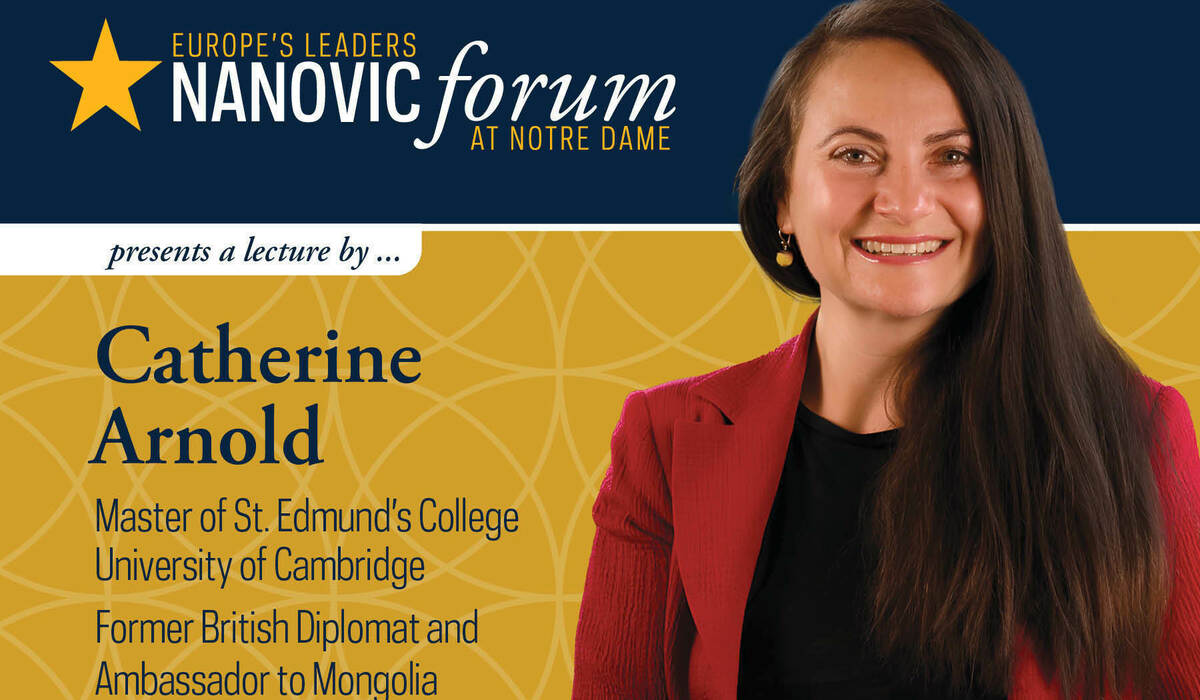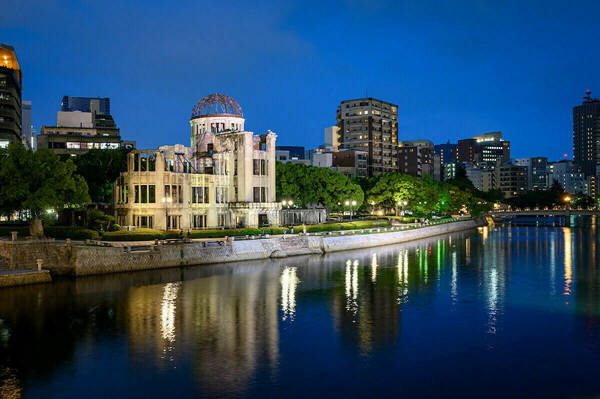Master of St. Edmund’s College and former British diplomat visits Notre Dame as Nanovic Forum Diplomat in Residence

Catherine Arnold, master of St. Edmund’s College at the University of Cambridge, joined the University of Notre Dame between March 18 and April 5 as the Nanovic Forum Diplomat in Residence at the Nanovic Institute for European Studies. While she devoted most of her stay in residence to class visits, meetings and similar private events, she will also offer a public lunch lecture at 12:30 p.m. Wednesday (April 3) in 1050 Jenkins Nanovic Halls. Combining her unique perspective as a leader in higher education and diplomacy, Arnold will demonstrate how diplomatic thinking can help educate thinkers and leaders for the future.
Before being named head of St. Edmund’s College, Arnold served with the Foreign and Commonwealth Office (FCO) in the United Kingdom with posts in Oman, Iraq, Iran and Afghanistan. In 2015, she was appointed the British ambassador to Mongolia where she served until 2018. Following her ambassadorship, she led units within the FCO, including the Illegal Wildlife Trade Unit, and helped the U.K. secure its bid to chair the 2021 United Nations Climate Change Conference.
Because of her extensive diplomatic experience, the Nanovic Institute invited her to teach and advise its Diplomacy Scholars students during her stay. Clemens Sedmak, instructor of this course, director of the Nanovic Institute and professor of social ethics at the Keough School of Global Affairs, said, “Ambassador Catherine Arnold has not only the experience of a world-class diplomat but the heart of an educator, researcher and journalist, making her an excellent choice for both our Diplomacy Scholars program and as a speaker for the Nanovic Forum, which focuses on bringing leaders from Europe to Notre Dame to engage with our students, faculty and community.”
Sedmak added that Arnold knows Notre Dame well, as the partnership between St. Edmund’s College and Notre Dame is important for the entire University. “We are pleased to deepen this connection,” he said. “Ambassador Arnold’s visit will be a boon to students within the Keough School and across campus who are interested in global affairs, diplomacy and foreign policy.”
The lecture, titled “Diplomatic Thinking: Lessons in forming thinkers and leaders,” is open to all Notre Dame students, faculty and staff, as well as the general public. Participants will be offered lunch before the event, beginning at noon and while supplies last. The event will be recorded and published afterward on the Nanovic Institute’s YouTube channel, as well as archived on its website.
Generously established by Robert and Elizabeth Nanovic, the Nanovic Forum’s mission is to bring Europe’s leaders from many fields to Notre Dame to explore, discuss and debate the most pressing questions about Europe today. Past Nanovic Forum visitors have included, among many others, Mikuláš Dzurinda, prime minister of Slovakia (1998-2006); Giorgi Margvelashvili, former president of Georgia; Kolinda Grabar-Kitarović, former president of Croatia; and Anne Applebaum, Pulitzer Prize-winning historian and Polish American journalist.
Previous Nanovic Forum addresses may be watched on the Nanovic Institute’s website or YouTube channel.
Originally published by at nanovic.nd.edu on March 28.
Contact: Tracy DeStazio, associate director of media relations, 574-631-9958 or tdestazi@nd.edu
Latest International
- Statement from University President Rev. Robert A. Dowd, C.S.C., on the anniversary of the atomic bombing of HiroshimaToday, on the anniversary of the bombing of Hiroshima, Father Dowd offered remarks at the Elisabeth University of Music as a guest of its president, Yuji Kawano, and Bishop Alexis Mitsuru Shirahama of Hiroshima. Father Dowd focused on the role that universities can play in addressing the current nuclear predicament and the wider challenges of peace in today’s world.
- Vatican honors Martin and Carmel Naughton with papal awardThe late Pope Francis, in one of his last acts, conferred the honour of the Order of Saint Gregory the Great upon Carmel and Martin Naughton, Trustee Emeritus of the University of Notre Dame. The papal honor is in recognition of the Naughtons’ outstanding philanthropy in the areas of education and the arts, particularly in the provision of philanthropic support and scholarships to Catholic education at the University of Notre Dame and Kylemore Abbey, and in their transformative contributions to higher education in Ireland.
- Prioritizing prenatal care may decrease low birth weight outcomes in The Gambia, Notre Dame research findsA new study co-authored by University of Notre Dame researchers highlights the importance of prenatal care for improving the health of mothers and newborns, providing evidence that can inform policy.
- Navigating the waters of peace: Researchers address challenges, opportunities in implementation of Colombia's Peace AgreementNearly half of the commitments outlined in Colombia's historic peace accord face significant challenges and may not happen in time unless policymakers make several key interventions, warns a new report from Notre Dame's Peace Accords Matrix. The report offers a blueprint to salvage an accord that has lagged behind its implementation deadlines, putting its legacy at risk. It highlights timely fixes that can strengthen the agreement.
- Partial peace deals may facilitate comprehensive accords, offering roadmap for policymakers, practitionersPartial peace agreements — deals that address targeted issues on the way to larger comprehensive accords — could provide a blueprint for peacebuilding policymakers and practitioners, according to new University of Notre Dame research.
- CANCELED: University to host Cardinal Pedro Barreto of Peru and Cardinal Peter Turkson of Ghana as part of Notre Dame ForumAs part of the 2024-25 Notre Dame Forum, Cardinal Pedro Ricardo Barreto Jimeno, S.J., of Peru and Cardinal Peter Kodwo Appiah Turkson of Ghana will visit the University of Notre Dame to participate in a conversation with President Rev. Robert A. Dowd, C.S.C., at 11:30 a.m. April 25 in the Smith Ballroom of the Morris Inn. The conversation is open to the public and will also be livestreamed for both Spanish-speaking and English-speaking audiences.













